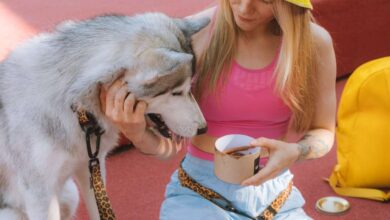
Weight problems isn’t just a human downside; it impacts our beloved pets as nicely. As pet homeowners, it is our accountability to make sure our furry companions lead wholesome and blissful lives. On this complete information, we’ll delve deeply into the important problem of managing pet weight problems, understanding its causes, recognizing the indicators, and exploring efficient methods for weight administration.
Table of contents
- Understanding Pet Weight problems
- Indicators of Pet Weight problems
- Well being Dangers of Pet Weight problems
- Managing Pet Weight problems
- Ideas for Pet Weight Administration
- Success Tales and Help
- Pure Pet Weight Loss Cures
- Pet Weight problems Help Teams
- Sustaining a Wholesome Weight
- The Function of Pet Homeowners
- Celebrating Success
- Managing Pet Weight problems
Understanding Pet Weight problems
What’s Pet Weight problems?
Pet weight problems refers back to the extreme accumulation of physique fats in pets, resulting in well being issues and a decreased high quality of life. It is not only a beauty concern; it is a extreme well being problem that may scale back a pet’s lifespan.
For instance, a Dachshund that’s considerably larger weight could also be vulnerable to again issues, joint points, and diabetes.
Causes of Pet Weight problems
Understanding the foundation causes of pet weight problems is essential to addressing this problem successfully. The first elements contributing to pet weight problems embody:
- Overfeeding: Offering extra meals than your pet wants can result in weight achieve.
- Lack of Train: Inadequate bodily exercise contributes to weight achieve and a sedentary life-style.
- Poor Weight loss program: Low-quality or high-calorie diets can result in weight problems.
- Feeding Habits: Frequent treats, desk scraps, and feeding from the desk can lead to extra calorie consumption.
For instance, a cat that receives frequent high-calorie treats can shortly turn into larger weight.
Indicators of Pet Weight problems
Recognizing the indicators of weight problems in your pet is step one in addressing the problem. Frequent indicators embody:
- Extreme Weight: Apparent indicators of weight achieve, comparable to a protruding stomach or issue feeling their ribs.
- Problem Shifting: Struggling to rise up, climb stairs, or leap onto furnishings attributable to extra weight.
- Lethargy: Unwillingness to interact in bodily exercise or play.
- Problem Respiratory: Labored respiratory and panting, particularly throughout reasonable exercise.
As an example, in case your Beagle is changing into much less lively and has gained weight over time, it might be an indication of weight problems.
Well being Dangers of Pet Weight problems
Pet weight problems is not nearly aesthetics; it might probably result in extreme well being points, together with:
- Diabetes: Weight problems is a major threat issue for diabetes in each canine and cats.
- Joint Issues: Extra weight places pressure on joints, resulting in circumstances like arthritis.
- Coronary heart Illness: Weight problems can improve the chance of coronary heart illness in pets.
- Respiratory Points: Respiratory difficulties are widespread in excessiveer weight pets.
- Lowered Lifespan: Weight problems can considerably shorten your pet’s lifespan.
For instance, an larger weight Labrador Retriever might develop arthritis, which may severely influence their high quality of life.
Managing Pet Weight problems
Seek the advice of Your Veterinarian
Step one in managing pet weight problems is to seek the advice of your veterinarian. They’ll assess your pet’s general well being, decide their ultimate weight, and create a personalized weight reduction plan.
For instance, your veterinarian might suggest a selected eating regimen and train routine in your larger weight Shih Tzu.
Implement a Weight Loss Plan
A weight reduction plan ought to embody a number of key components:
- Dietary Adjustments: Transition your pet to a balanced, portion-controlled eating regimen appropriate for weight reduction.
- Common Train: Improve bodily exercise progressively to assist your pet burn energy.
- Monitoring Progress: Common weigh-ins and check-ups together with your veterinarian are important to trace progress.
As an example, a weight reduction plan for an larger weight Persian cat might contain switching to a weight administration system meals and inspiring each day playtime.
Ideas for Pet Weight Administration
Listed below are some sensible suggestions for managing your pet’s weight:
- Portion Management: Measure your pet’s meals parts to make sure they obtain the correct quantity of energy.
- Wholesome Treats: Select low-calorie, nutritious treats or go for alternate options like carrots or inexperienced beans.
- Interactive Toys: Have interaction your pet in play with toys that encourage motion and train.
For instance, an larger weight Pug can profit from portion management and interactive play with treat-dispensing toys.
Success Tales and Help
Managing pet weight problems will be difficult, however it’s doable with dedication and help. Search out success tales and be part of pet weight problems help teams to attach with others dealing with comparable challenges.
As an example, listening to about how a Chihuahua efficiently misplaced weight by eating regimen and train can encourage and inspire you in your journey.
Pure Pet Weight Loss Cures
Along with a balanced eating regimen and train, some pure cures might complement your pet’s weight reduction journey. All the time seek the advice of your veterinarian earlier than incorporating these into your pet’s routine:
- Inexperienced Beans: These low-calorie greens generally is a wholesome various to conventional treats.
- Pumpkin: Excessive in fiber, pumpkin may help your pet really feel full with out consuming extra energy.
- Apple Cider Vinegar: A small quantity in your pet’s water might support digestion and weight administration.
For instance, including a tablespoon of plain, canned pumpkin to your larger weight Dachshund’s meals may help management their urge for food.
Pet Weight problems Help Teams
Embarking on a weight reduction journey together with your pet can really feel overwhelming, however you are not alone. There are pet weight problems help teams and on-line communities the place you may share your experiences, search recommendation, and discover motivation from others who’ve efficiently helped their pets shed extra weight.
As an example, becoming a member of an internet discussion board for pet homeowners with larger weight Beagles can present helpful insights and encouragement.
Sustaining a Wholesome Weight
As soon as your pet has achieved a more healthy weight, it is important to take care of it. Listed below are some suggestions for guaranteeing your furry companion stays match:
- Common Examine-ups: Proceed to go to your veterinarian for routine check-ups to observe your pet’s weight and general well being.
- Consistency: Follow the portion-controlled eating regimen and train routine that helped your pet shed weight.
- Preventative Measures: Control your pet’s weight and make changes as wanted to stop regaining misplaced kilos.
For instance, in case your Labrador Retriever efficiently shed extra weight, sustaining common train and a balanced eating regimen will probably be essential in stopping weight regain.
The Function of Pet Homeowners
Pet weight problems is commonly a results of well-intentioned however misguided actions by pet homeowners. To make sure your pet maintains a wholesome weight, it is important to grasp your function of their well-being:
- Portion Management: Keep away from overfeeding and strictly observe the beneficial parts in your pet’s meals packaging.
- Wholesome Treats: Select low-calorie treats and restrict them to occasional rewards for good conduct.
- Train Dedication: Proceed to prioritize common train and playtime together with your pet.
As an example, as a accountable pet proprietor, try to be vigilant about portion sizes and keep away from giving in to your cat’s persistent pleas for additional meals.
Celebrating Success
Each small milestone and achievement in your pet’s weight loss journey must be celebrated. Constructive reinforcement, comparable to reward and further playtime, can inspire your pet and strengthen your bond.
For instance, in case your Chihuahua reaches their goal weight, commemorate the achievement with a particular toy or an extended play session within the park.
Managing Pet Weight problems
Managing pet weight problems is a journey that requires dedication, endurance, and love. By recognizing the causes, indicators, and well being dangers of weight problems, consulting your veterinarian, implementing a complete weight reduction plan, and sustaining a wholesome life-style, you may assist your pet lead a happier, more healthy, and longer life.
Keep in mind that pet weight problems is solely preventable and treatable. Together with your dedication and the help of your veterinarian, your loved one pet can keep an optimum weight and revel in a life full of vitality, playfulness, and pleasure.








